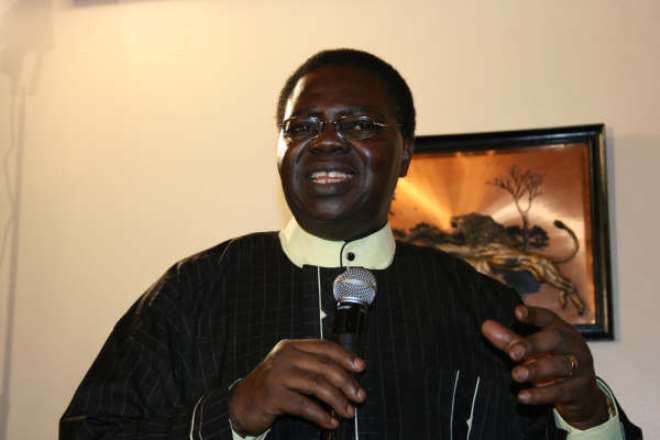EBENEZER OBEY AND HIS MANY SECRETS! ''MY MOTHER NEARLY STOPPED MY MUSIC CAREER''
His rare encounter with white MD of Decca that turned his life around
It was not an easy task to get an interview with a very busy super star like, Evangelist Ebenezer Obey Fabiyi because of his local and international engagements. This reporter had been on the trail of Obey, the Juju music maestro whose songs are laced with philosophy and faith in God, for about five months through Evangelist Fadipe. The patience paid off when Obey Fabiyi signified his readiness for the interview. This reporter was accompanied by Mr. Omolade, a friend who had a chance meeting with Obey, 28 years ago. The interview was infectious as all of us present sang and chorused some of Obey's evergreen hits in this rare expose and journey into Obey's background, world and most kept secrets as if we were rehearsing with his Inter Reformer's band.
Before the interview proper commenced, Obey was presented with copies of the books: Ilaro-Memories of 'Operation Wet E' and the 'Civil War Years and Historical Studies on Global Scam and Nigeria 's 419' written by this reporter. Obey who also lived in Idogo near Ilaro in his childhood days was overjoyed and expressed satisfaction with the writing of the books. Though we agreed to have the interview under an hour, we soon found that we stretched beyond the expected time. Excerpts of the interview:
BEFORE we start, I will like to present these books to you. We will like to know some things about you?
(He looks at the books) When people see this one titled, Ilaro-Memories of Operation Wet E and the Civil War years, those who did not know that such an event took place will take the book and wonder if such an event happened in Nigeria. The book, to me, is similar to the way people talk about heroes in America and Europe. Today, the joy for me is to meet someone like you. And when you mentioned Ilaro town, it struck me. I grew up in that area. I was born in Island Maternity in Lagos. They used to call it Mercy Hospital. My mother became pregnant in Idogo, near Ilaro, and came to Lagos to deliver me.
Immediately after the delivery, she went back to Idogo with me. So, I grew up in Idogo. Everything about Ebenezer Obey started from that area called Idogo. In those days, they called that area Egbado.
Now they call it Yewa. But, in those days, it was called Egbado. In the colonial days, they called Egba region Egba Oke and they also had Egba Odo or Egba Eti-Odo known as Egbado. We were living in Egbado. Our parents were there though we are from Abeokuta. So, whenever I hear or see something from Egbado, it touches me and I am always interested. I consider myself as part and parcel of Egbado, now Yewa. So, you are welcome to my place. I thank you for the books and I will read them. I will finish them quickly too.
Your songs have been highly motivational and inspirational. Please tell us what inspired you to sing about God, the philosophy of life right from the beginning of your career. Even when you praise people, the thought of God and how to live well in life have always featured in those songs. Three quarters of every album and song is devoted to God and the philosophy of life. Why?
I believe the secret behind the summary of what you have said, that is, the inspiration that made my work, every release, behind every work that I made to be devoted to God and philosophical lyrics - the secret is, I believe, it was my mother's influence. And what is this? My mother was a believer.
The circumstances that surrounded the life of my mother made her to be a good believer. My mother after spending several years with her first husband, there was no issue. That marriage was not blessed with children. And the parents of that man looked at the marriage of so many years, I think it was almost 20 years - definitely over 19 years.
The influence of parents in those days was great. They spoke to the man, 'you cannot continue like this.' So, they had a family meeting and called my own mother's relations and that man's parents. They said: 'We love this woman, but just look at it. After these years, is it not good for them to separate because the doctors have told this woman, that she would not be able to have a child?' So, it was a big blow. It was a shocker to my mother.
That was in Lagos. The man was a senior station master with the Railways. You know we used to have SM, that is station master. The man was a senior station master, SSM, a big post. The incident was a shocker and a blow to my mother. That was how my mother's brothers took her to Idogo. They were in Idogo because of the cocoa production business they were involved in. You know the Egbado, now Yewa area was noted for cocoa production.
My father actually went to Idogo to be a cocoa farmer and, at the same time, he was a carpenter. So, my father was a friend to my mother's elder brother who came to Lagos to bring her to Idogo to hide her face from shame. But the man of God who prayed for my mother said, “The grace of God is sufficient for you” despite the fact that the doctors said she could not have a baby. The man of God said that the grace of that God covers everything and can do anything in the life of a person.
Grace is a five-letter word. This is the month of May - the fifth month. So, grace in my own life is so important. That man did not just say those things to my mother. It was the Holy Spirit that guided him to say those words. And that became a factor. My mother leaned upon that word of the man, that word that said, “The grace of God is sufficient for you!
“And the man told my mother she should be praying and saying, “God, your grace is sufficient for me despite all that the doctors have said.” So, my mother became a believer, a strong believer that she held on to that word, “God your grace is sufficient for me.” So my mother was doing everything, praying. And when she got to Idogo, even though the doctors said she could not bear a baby, she became pregnant with my sister. Truly, the grace of God was sufficient for her. Before she knew it again, she became pregnant and had me. And my mother told me that when my father called her, “what are we going to name this boy?”, she told my father, “Ebenezer! Hitherto, the Lord had helped us!” which in Yoruba we say, Nihin Ni Oluwa Ran mi Lowo De!
And you even sang a song on Ebenezer!
Yes, yes. My mother said, she had a baby boy and a baby girl, there was no third one. And the grace of God was sufficient for her. So, she became so strong, it was that influence that rubbed off on me. So, I grew up seeing myself in the church, following my mother to the church. I just grew up and didn't know these things.
It was when I grew up that my mother told me all these things. They told me I used to play the choir instruments and I used to trouble the choir while they were playing music. Somebody cited how I was troubling the choir even at that very young age. My mother told me that there was a time they were having a revival and the man of God there carried me and said: “This boy is going to be a very popular musician.
This young boy, this baby that I am carrying is going to be a popular musician!” So, I grew up in the church. And I was actually influenced in music through church music. When I started schooling, I became a member of the school band. I later became the school band leader. As I was doing that at school, I was also a member of the choir. So, that's the secret. I will trace the secret down to my mother's faith in God. That was all that I picked up in my upbringing. I saw my mother demonstrating faith and faith. So, that became part of me and the inspiration started coming from that.
Let's talk about your first record. If you look back now, were you able to sell well?
That's another long story. It's a long one. The story about my first album is another big story. Why did I call it a big story? Everything can be traced to my mother. When we were in school, we had several boys and girls clubs. We had drama department in the school. I was a good actor in the school. Every prominent role was given to me as an actor.
The lead role was given to me and I acted from a very young age roles like Moses, Samson, all those personalities in the Bible. We called it “entertainment” in those days and not drama as we now call it. It was usually done at the end of the school session. We used to dramatise different stories. From the music department in the boys and girls clubs, I became the best because of the gift of God in me. I could handle any instrument and sing. Not everybody can play instruments and at the same time sing. Not everyone is that gifted.
Some people, when they are drumming or playing on an instrument, their concentration will be on that. One will go for the other. But with me, it's different. God knows how He does His things and the gift He gives. With the gift of God in me, I can handle all instruments and sing.
I was doing those things. I would sing. I sang along and also played. So, whenever we went for outing or entertainment, if I did not go, the show would not go on well. People always thought it was my show. From there, my mother really did not want me to go into music. I cannot blame her. Such a mother who had such an experience as I told you earlier, wanted me to be a lawyer or a doctor. But music was so much in me and I continued to play. But my mother was not so pleased.
She did everything she could do to counsel me out of playing music. But I loved it and I decided to settle it with my mother by asking her; “Mummy why is it that you do not want me to play music?” She answered that it was because of the rough lifestyle of musicians. She said they smoke, drink and she did not want her son to indulge in those things. That made me to promise her that I would never go into all those things. That really, really helped me. So, I went into music. I promised her that I would go into music and come out good as a shining example and God has helped me to keep to that.
He made me a good example.
That now leads me to your question. In our days, it's not like now that when you want to record, you take your “demo” to whoever you want to record you. Number one; there were no tape recorders like this or the digital one you are carrying. The only tape recorder that was available then was the one they used in recording the records all over the world. So, DECCA West Africa Records Company happened to be here. I struggled to DECCA West Africa to show them I was interested in recording for them. It was a rough road. First, I lived in Mushin area of Lagos. Secondly, I didn't have money to go to their office at Abibu-Oki Street in the heart of Lagos. So, I trekked all the way from Mushin to Lagos.
Mushin to Lagos ?
Oh …yes! That was a child's play in those days. It was a child's play. The second bridge - Eko Bridge was not there and Third Mainland Bridge of course was not there too. It was only the Carter Bridge that was built and we just walked through it.
(Mr. Omolade cuts in) I saw you at Fadeyi area about 28 years ago when your office was at Shipeolu Street. Then you were trying to cross the overhead bridge and we met at the middle and I greeted you and you greeted me as well.
Even that one you just spoke about was coincidental. Because 28 years ago, I had everything to make me comfortable.
Were you just exercising by walking through the bridge?
There was a reason I walked through that bridge that day and it was a coincidence that we met. The time I was going to DECCA at Abibu-Oki to tell them about my music, there was nothing at all. But, 28 years ago, I had already built these houses.
The time you were talking about was about 1976 and 1977. I had already built these places. The cars, the wealth were already there. So, that day, there was a purpose for me to walk through the bridge. So, on the day I was going to DECCA, I walked from Mushin to Yaba, from Yaba to Oyingbo; from Iddo to Carter Bridge and, from there, I got to Idumota and now proceeded to Abibu-Oki Street where DECCA was located.
So, when I got there, the Igbo gateman who was at the entrance did not want me to enter. I told him I came to record for the company. He told me that his boss was not around. Then I convinced him and he said ok and he allowed me in to see the secretary. The secretary said that the artiste's manager was on leave and I couldn't see the managing director who was a white man. I told the secretary, “I am a star and I have come to record for your company. And my record will make your company a bigger one.” So, the woman said, “You cannot see him!” But I insisted, “I must see him!”
Despite the trekking from Mushin ?
I insisted and said: “I am a star and my record will make your company a bigger one.” But the woman kept on saying:” No.” But I said I must see the managing director. I have to see him. Then the managing director pressed his intercom telephone and he was hearing our conversation.
Released record
Then he asked, “What's all the noise about?” Then the woman said “it's this man who said he is a star and will like to see you and I said he cannot.” Then the MD asked, “A star?” And the woman answered “yes." The MD said she should allow me to see him. I went in and greeted him saying, “Sir, I am a star - a future star. I have come to record for you. Just record me and don't pay me until when you have recorded me and you see the sales of the released record. My record is going to sell.” Then he looked at me and called one of his officers, “Mr. Odunaya, just come upstairs, come and see this young man.” Then I repeated what I just said again, “I am a star, I want to record. Don't pay me until you have seen how my record is doing in the market.”
The managing director who was a white man did not even allow the Nigerian to talk before saying; “This young man is talking with all confidence. I think we have to record him.” Then the Nigerian man said, “Yes, I think we have to record him.” The procedure of recording in those days was not easy. Number one, you have to take your own band to them in the studio. They have to hear you; they would then be able to confirm that you are a marketable artiste.
To confirm what I had told them, I had to take my band to their studio. They now gave me a recording date and I went there with my band. The other procedure was that they had to call all the artistes and all the distributors to come and listen to each artiste. They would say: “This is a new artiste, his name is Ebenezer Obey. The title of his song is so and so. If you like the song, book your order!”
People will now say, “I book 10 copies; I book 20 copies and so on.” When they calculate your order, if it's not up to 500 copies, you have failed. I am just shortening the whole story. When it came to my turn, they introduced me and I played and said, “That's the first side of the record.” I played again, and informed them “that's the second side.” They said people should now order. When they calculated the order, my shortfall was 19 to make up the 500 copies mark. So, the MD said “future star failed?” All of the workers knew me by then. And they said, “Sir, your future star didn't make it.”
The MD asked them, “what's the total number?” They answered,” 481, remaining 19!”
For the first time, the MD said, “I order 25 copies for him to make it.” Because I went to him and told him, “this is a future star, I am a future star and I am going to make it.” He had never done that before. He ordered 25 copies. To answer your question, that's what now led to my second album, Olomi Gbo Temi (My Dearest Wife Listen to Me) which was a chart buster.
After the chart buster, what did the managing director say?
I called him father and he called me son.
Can you remember his name now because that was a long time?
Mr. C. K Cress. And everything I said, he believed. We were so close. And other artistes became envious of our relationship.
Handling recordings
They said they were handling my recordings specially and that they weren't handling their own well. But the truth was that they were handling everything specially and no special treatment was given to my records. That was how I started. From there, anything I touched was gold, gold.
First, you released a record in 1968, titled; Omo wan n're soja a fe sokun meaning We are crying because our sons are going to war. It was during the civil war. Second, Omo enia kilo seyin Te feran okunkun jumole lo A Araiye, e yi iwa yin pada E jeka gbo T'oluwa, meaning, Human beings, why do you love darkness more than light, repent and hear the Lord. Third, you have never been known to be annoyed with anyone or a very close friend openly before. But you sang a song; Se rere o ore se rere dakun o ni tori ola meaning 'Be good my friend because of tomorrow.' That was in 1969.
There is another record, Oluwa Ba o wi o Satani; meaning The Lord has rebuked you Satan.
There is nothing in your record that one can throw away.
(Mr. Omolade Cuts in) I am a Muslim, but I like all these records and the first time I heard the record, Thank you Jesus
O Seun o, Jesu, O Se o, Jesu o Mo dupe O Jesu, O, Se o, Jesu O,
I ran to the store and bought it. What prompted each of these records?
I want to touch everything that you have said. Some facts that had never been said before will come out today. Number one; the civil war started in 1967 and we had a slogan in Hausa (sings it and we chorus along with him.).That was going on the air waves. I saw the current affairs then and how people were unhappy that their sons were going to war. People were being conscripted into the army. The war started. People did not like going into the war. Many were forced into it. I decided; let me do a record on the events. I used that slogan at the beginning of the record. The song was,
“Omo wa nre soja, Afe sunkun, Abode Soja, Ekun a derin o E je ka se adura fun awon Omo wa to re Soja A lo a dara,
Abo a san won o Gbegbe igbe soko, Iwaje o”
Meaning "we are weeping because our sons are going to war They will go well and return unscratched .
T'ebi Tore O Eye e ma sokun mo Gbegbe igbe soko iwa je o Oko ide oko ko ma ma mu Takude Wale O Baba Loke, Gbadura Wa 0 (2ce)
Fiso e sowa Baba O Kama ma b'ogun lo O. Baba loke Gbadura wa.
Meaning "Friends and relations do not cry They will not be lost to the war Lord Almighty, hear our prayers over them" It was two minutes 45 seconds. I was inspired. After the chart buster, Olomi Gbo Temi, in those days, I used to record four to five records in a year.
That's true. We will still come to that. How were you able to compose them so easily?
The white man, the MD of DECCA Records, would call me. I will say “I have this composition and I think it will go sir!” I was the only artiste who was relating to the MD that way. Other artistes did not have that access. It was God who did it for me. He would just call me, “Ebenezer, you want us to try it? O.K!” He would say, “Can we record on Wednesday night?” Because the man will go to office during the day. Where he lived was the studio and we would record in the night. He would ask again, “Ebenezer do you have another idea?”
The second record you asked about, Odale Ore, Ewa wo Odale Ore, To Gbe Koto Si waju To ni ka kalo,” meaning,“ The treacherous friend who dug a pit and lure us into it.” That was in 1969. That was recorded in London . And that was my first L P (Long Play) record. I had, Awa Lomo Abeokuta , Ilu Rere Ilu Olola, Then Ibadan, Ogbomosho” etc were the other tracks.
What I did in my record was two-fold. One side for students and the other for adults. For example, Olomi Gbo Temi, the youngsters like that. In Omo Wa Nre Soja, both the young and the old like that. That sequence led to, Ore mi, e se pele pele, Taiye Banfe E, ko rora Jaiye O, Aiye o feni foro, A fori Eni. (We begin to chorus together) meaning, "Dear friend you better tread softly. If the world is showing you love. Do enjoy carefully. Because there is no true love It's only destiny and God that guides.”
Although I like the song, I was very naïve about the lyrics and I didn't understand the import until the recent past.
So the sequence of my songs is to carry everybody along.
Then, Omo Enia Kilo Se te Feran okun kunju imole lo, Nibi ti won ba n'pidan T'eba d'ebe Ero repete ni Nibiti won ti n soro oluwa o Sasa enia loma duro gbo. A! araiye E yi iwa yin pada o E je ka gbo ti Oluwa. Meaning "You human beings why do you like darkness more than light? Repent and hear the word of the Lord Whenever you get to where they are having magic You will see many people But where they are preaching the word of God The place will be very scanty."
I never knew that one day, I will become an evangelist. But that was the leading. The white MD of DECCA Records always called me, “Ebenezer, do you have anything for us? Have you thought of anything lately?” I was the only artiste the man was relating to that way. He saw that what I told him came to pass.
When you get inspired and issues became knotty, did you revert to consult your mother as regards the music and the Yoruba proverbs and idioms you use?
I listened very much to elders when I was young... I listened so much. I have assimilated so much from my parents. My parents never broke the law. They were very gentle and they always told me, “Remember the son of whom you are!” If we were walking on the road and found one shilling in those days and we picked it, my mother would instruct that you return the money to the spot where it was picked.
Composing of songs
She would say, “What if the owner of the money comes to look for it?”
But someone else might pick from the same spot?
Her belief was that her own child must not hold other person's belongings. Even if we told her we found a pen on the road; she would follow us there to make sure we have returned it to the spot. She would not think that someone else might pick it. Her stand was that if they traced it to you, they would not say you found it. They would say it was stolen. All these things shaped my world outlook.
How did you cope with such huge releases of about six songs on each side of the LP and four to five records in a year?
When I was releasing four, it used to be in singles, EP, (Extended Play), and I mixed it, with LP (Long Play). Some of it will be Extended Play and some of it will be LP. But, later on, even with the LP, I used to release four, at times five in a year. I give God the glory. He gave me the gift to compose songs. So, it was never a problem for me to release those albums.
Your rhythm was smooth and unique. It blended. Everything in your beat synchronised. How did you select your band members?
You see, the synchronisation of my music was borne out of the fact that I started music from school, clefs (those sticks you see musicians knocking together) Ko ko ….ko ko…. I played from that. There's no instrument I cannot play. So, I know these things and I know good instrumentalists and I happen to be one of the best in my own time. So, those of us who were in that category knew ourselves. Yorubas say: “Egbe Eiye Leiye n' wole,” meaning Birds of a feather flock together. So, those of us who were the best knew ourselves. Just as if you have a good lawyer, he wants to work in the chamber of another extremely good lawyer. That was how God made it.
And how did young captain, Mr. Samson Ogunlade, become captain?
He became captain because I used to be captain of a band under my own band. Somebody who was very active needed to take the role of captain. So, that was it, he could coordinate activities. A captain was to assist the band leader – checking to make sure everything was working well.
I know you to be somebody so passionate and emotional. When the late Oke Aminu, your ace drummer, died, you sang about him and you took many steps too?
The main thing is that I have always believed in team work. Even now that I am in the Ministry, it's team work. I believe so much in team work. A good leader must select his team and involve them. When you select your team, you must let them know how the work should be done. It's like doing a workshop or an orientation. You must involve everyone no matter their position, whether a sweeper or a messenger. There is team spirit. If you don't have it, then there will be problem and you won't be able to belong to the team. I will send you out if you don't have it. I will transfer you somewhere else.
Appreciating contributions
If you are a leader who believes in team work, you will love everybody. You will appreciate the little quota anyone is contributing. It has the good side and the bad side. The good side is that when you appreciate people, it gets into some people's head. But it doesn't matter.
That's why these days, you don't see musicians doing what I have done in the past. That's why in the record Board Members I sang, “Obey Obey Commander Baba…… Chief Commander Baba Oluwasina, Baba Olanrewaju….“and I started to praise the band from myself down to everyone in the entire band. It is the appreciation of the band that led to that. These days, some musicians will never mention the names of their band members and I don't blame them. Because I paid price for doing those. But I enjoyed it and I am happy. Remember, I sang, “Inter Reformer, Inter Reformers Inter Reformers, Inter Reformer atun de”. And I started mentioning their names again. Or “Oro kan Ni mo fe ki yin Eyin Enia, International brothers, E ba mi dasi, Ninu Obi eni tabi Aya eni, Ewo lose pataki, To se koko,” then they replied, Chief Commander, Ese adupe, A o Gbodo foro Obi We taya eni.” I composed the song to bring leadership and followership together. If I didn't mention their names, heavens will not fall.
We also know that even when Muslim brothers come to you, you assisted.
The reason is this. My upbringing is the first. We have Fabiyis who are Muslims and Fabiyis who are Christians. In my mother's family it's the same. During Eid-El-Fitri, we would go and celebrate with our mummy's elder brothers who are Muslims. We engaged in the slaughtering of rams and so on.
During Easter or Christmas, they would also come around us. I sang, Christmas Special as well as Todun Ileya ba de Eran pipa Ose pataki fun awon onimale, meaning during Eid-EL-Fitri, killing of rams is very important to Muslims; Ero bami k' awo Alhaji, Ero bami ki awon Alhaji Gbogbo, that is, Help me greet Alhajis and Alhajas.
Your voice is also unique. Is it also divine?
Yes, it's also from God and I thank Him.
You have done so much for Nigeria. You sang to sensitise on Operation Feed the Nation, Austerity Measures, No place be like My Country to show patriotism and thank God you were given a national award, though it's God that rewards.
I thank God for the award and recognition. I am happy that it came from government to appreciate my contribution especially when one looks back; some of the things I sang about are coming to light. Look at it today; we are talking about food crisis.
Latest News
-
 "If You're For Me, I Am For You" - Cubana Chief P
"If You're For Me, I Am For You" - Cubana Chief P -
 "3 Days To Go" - Femi Adebayo Urges Fans To Get S
"3 Days To Go" - Femi Adebayo Urges Fans To Get S -
 "Stop Asking Me Questions About Speed Darlington"
"Stop Asking Me Questions About Speed Darlington" -
 "Benue Is The Most Underdeveloped State I've Ever
"Benue Is The Most Underdeveloped State I've Ever -
 Stan Alieke Urges Young Professionals To Take Lin
Stan Alieke Urges Young Professionals To Take Lin -
 Chizzy Alichi Teases Fans With Baby Reveal, Promot
Chizzy Alichi Teases Fans With Baby Reveal, Promot -
 "I'm Not Wearing Makeup From July 4th Till Decemb
"I'm Not Wearing Makeup From July 4th Till Decemb -
 "Stop The Challenge Of Mocking Kids With Down Syn
"Stop The Challenge Of Mocking Kids With Down Syn -
 Regina Daniels Celebrates Sons As They Mark Birthd
Regina Daniels Celebrates Sons As They Mark Birthd -
 Speed Darlington Threatens To Sue NAPTIP For Defam
Speed Darlington Threatens To Sue NAPTIP For Defam














